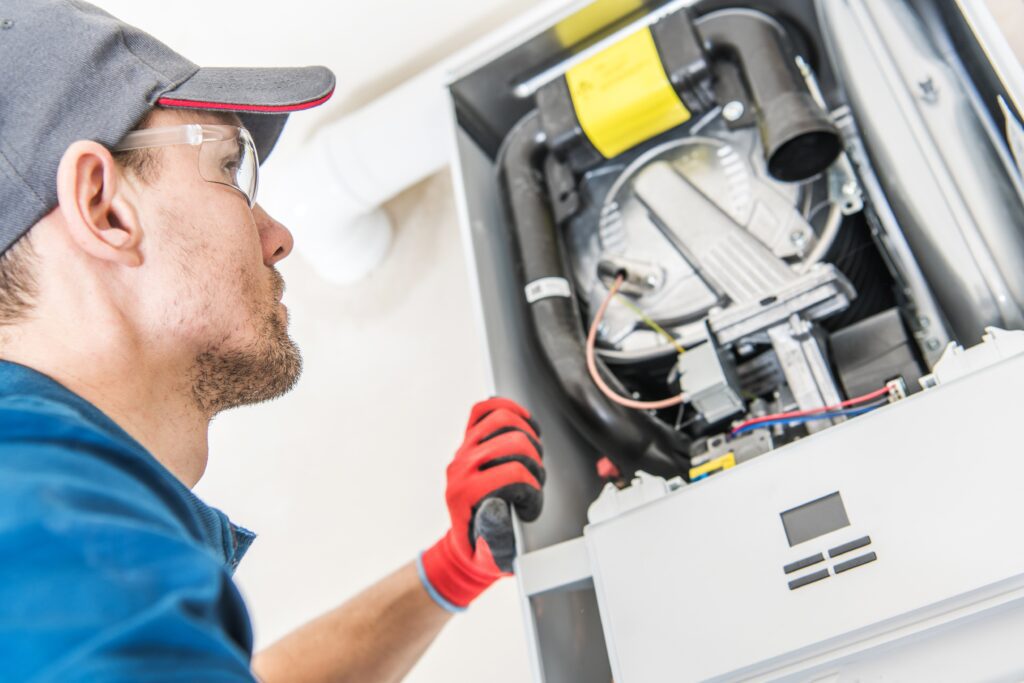Heating systems play a crucial role in maintaining comfortable indoor temperatures, whether in residential or commercial settings. However, like any other mechanical system, heating systems can encounter problems that may require repair or maintenance. In this article, we will explore some top heating repair tips that can be beneficial for both residential and commercial use. Understanding the basics of heating systems is the first step towards effective repair and maintenance.
Understanding the Basics of Heating Systems
Heating systems consist of various components that work together to provide warmth. It is essential to have a basic understanding of these components to identify potential issues and troubleshoot problems effectively.
Heating systems play a crucial role in maintaining a comfortable indoor environment, especially during the colder months. Understanding how these systems function can help homeowners and building managers ensure efficient operation and prevent costly breakdowns.
Key Components of a Heating System
The key components of a typical heating system include:
- Thermostat: Controls the temperature settings and regulates the operation of the heating system.
- Furnace: Generates heat by burning fuel or using electricity.
- Ventilation: Distributes the heated air throughout the building.
- Ductwork: Transports the heated air from the furnace to different areas.
- Heat Exchanger: Transfers heat from the combustion chamber to the air.
- Air Filters: Help maintain indoor air quality by trapping dust, pollen, and other particles.
- Circulator Pump: Moves hot water through the heating system in a boiler-based setup.
Different Types of Heating Systems
There are various types of heating systems commonly used in residential and commercial properties:
- Furnaces: Powered by natural gas, propane, or electricity, furnaces are the most common heating systems.
- Boilers: Utilize water or steam to distribute heat throughout the building.
- Heat Pumps: Transfer heat from the outdoor air or ground to heat indoor spaces.
- Radiant Heating: Uses electric radiant heaters or hot water pipes installed beneath the floor or in the walls.
- Geothermal Heating Systems: Harness the stable underground temperature to provide heating and cooling.
- Solar Heating Systems: Capture sunlight to generate heat for residential or commercial spaces.
Common Heating Problems and Solutions
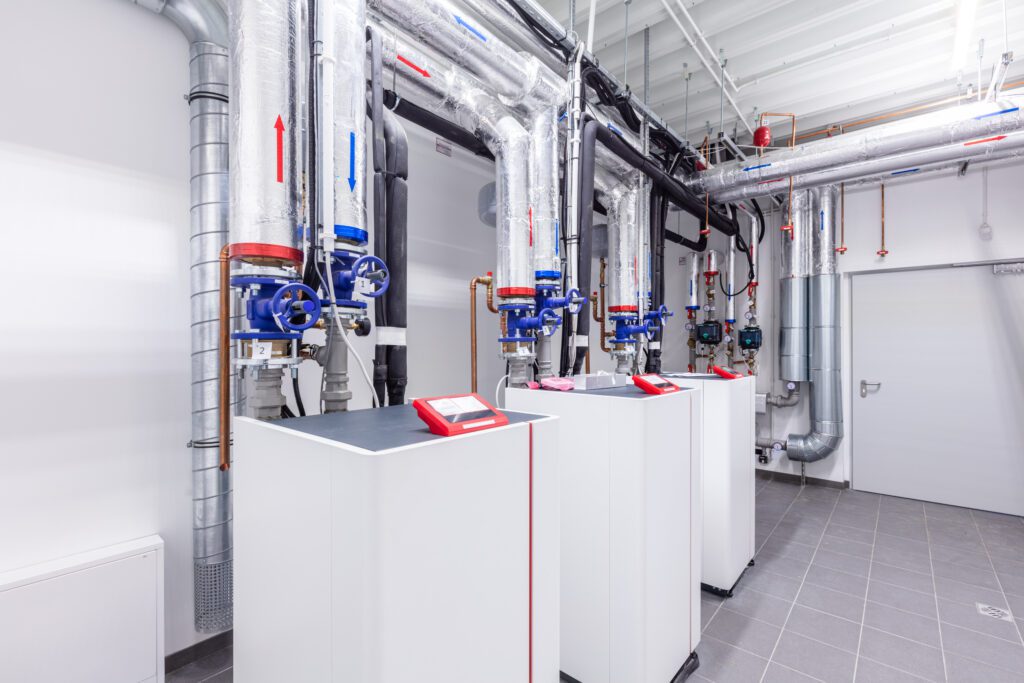
Knowing how to troubleshoot common heating problems can save you both time and money. Residential heating and commercial heating systems may encounter different issues, so let’s explore each of them separately.
Troubleshooting Residential Heating Issues
In residential settings, the following are some common heating problems and their potential solutions:
1. No Heat: If your heating system is not producing heat, check the thermostat settings, replace the air filter, and ensure that there is no blockage in the vents and ducts. Additionally, it’s worth mentioning that sometimes the issue might be with the pilot light. If the pilot light is out, relighting it might solve the problem.
2. Insufficient Heat: If the heating system is not providing adequate warmth, ensure that the thermostat is set correctly and the air filters are clean. You may also need to check for leaks in the ductwork or inadequate insulation in the building. Another factor to consider is the age of the heating system. Older systems might struggle to provide sufficient heat and may require an upgrade.
3. Uneven Heating: Uneven heating can be caused by airflow issues, such as blocked vents or dirty air registers. Make sure all vents are open and clean, and consider balancing the system by adjusting dampers. Additionally, if you have a multi-story home, it’s important to check if the heating system is properly zoned to ensure consistent heating throughout the different levels.
4. Strange Noises: Unusual noises, such as banging or rattling, can indicate mechanical problems. In such cases, it is advisable to contact a professional heating repair service to diagnose and fix the issue. Ignoring strange noises can lead to further damage and potentially costly repairs.
Now, let’s move on to commercial heating systems and the specific problems they may encounter.
Addressing Commercial Heating Problems
Commercial heating systems can encounter similar problems, but with higher complexities due to larger spaces and more extensive ductwork. Here are a few common issues and their solutions:
1. Lack of Maintenance: Commercial heating systems often suffer from insufficient maintenance, leading to various issues. Regular maintenance, including filter replacement and cleaning, should be carried out to prevent breakdowns and ensure efficient operation. It is also recommended to schedule professional inspections to identify any potential problems before they escalate.
2. Zone Control Problems: In larger commercial buildings, zone control can help regulate heating in different areas. If you experience temperature inconsistencies, faulty zone control dampers or thermostats may be the cause. It is crucial to have a qualified technician assess and recalibrate the zone control system to ensure proper functionality.
3. Power Problems: Commercial heating systems are usually more complex and require sufficient power supply. Tripped circuit breakers or blown fuses can disrupt the system’s operation. Check the electrical connections and address any power-related issues promptly. It is important to note that commercial heating systems may have multiple power sources, so a thorough inspection is necessary to identify the root cause of the power problem.
4. System Malfunctions: Complex commercial heating systems may encounter various malfunctions, such as faulty sensors, control board issues, or ignition problems. These problems should be diagnosed and repaired by qualified professionals who have experience working with commercial heating systems. Attempting to fix these issues without the necessary expertise can lead to further damage and potential safety hazards.
By understanding the common heating problems and their solutions, you can take proactive measures to maintain the efficiency and functionality of your heating system. Remember, when in doubt, it is always best to consult with a professional heating technician to ensure safe and effective repairs.
Essential Heating Repair Tips
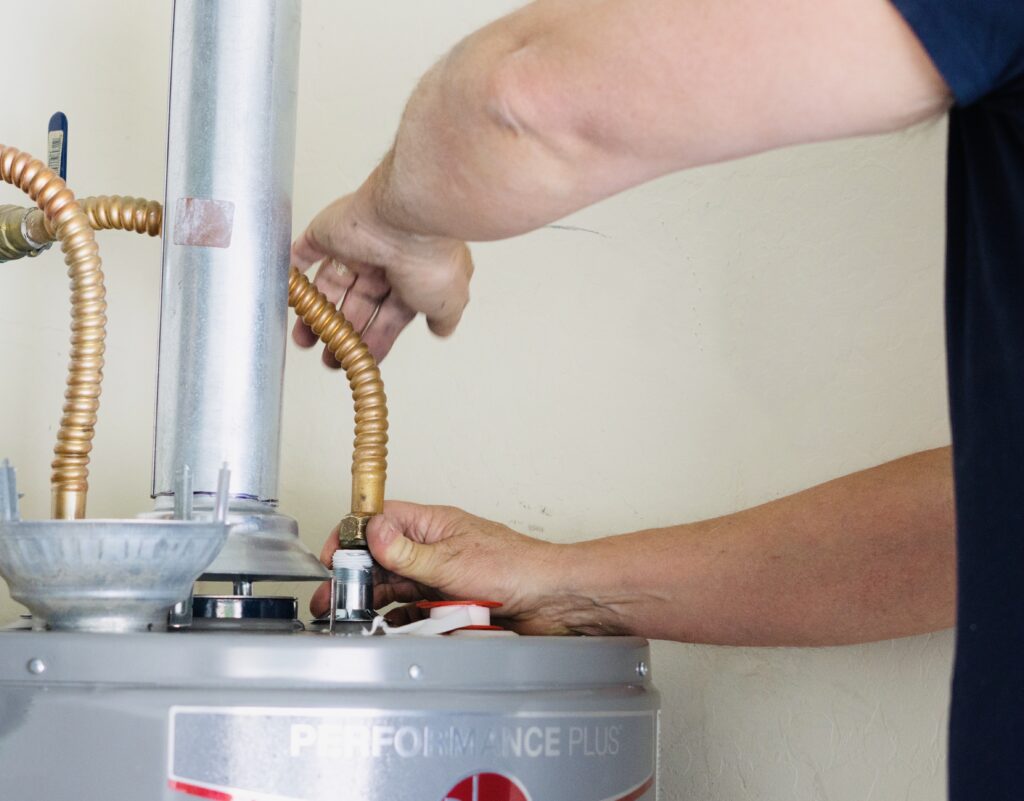
While some heating system repairs require professional assistance, there are minor issues that homeowners and facility managers can handle themselves. Let’s explore some essential repair tips for both residential and commercial use.
When it comes to DIY heating repairs, it’s important to prioritize safety and have a good understanding of your system. However, don’t let that discourage you from tackling minor heating system issues on your own. With the right knowledge and precautions, you can save time and money by handling these repairs yourself.
DIY Repair Tips for Homeowners
Before attempting any DIY heating repairs, ensure your safety and understanding of the system. Here are a few tips to help homeowners handle minor heating system issues:
1. Thermostat Calibration: If you’re experiencing temperature discrepancies, calibrating the thermostat can help resolve the issue. Refer to the manufacturer’s instructions for the correct calibration process. This simple adjustment can make a big difference in maintaining a comfortable indoor environment.
2. Replacing Air Filters: Clean or replace air filters regularly, as clogged filters can obstruct airflow and reduce heating efficiency. Not only does this improve the performance of your heating system, but it also helps maintain good indoor air quality.
3. Cleaning Vents and Registers: Regularly clean vents and registers to prevent blockages and ensure proper airflow. Dust and debris can accumulate over time, hindering the effectiveness of your heating system. By keeping these areas clean, you can ensure that warm air circulates efficiently throughout your home.
4. Checking Air Ducts: Inspect air ducts for leaks and seal them using foil tape or mastic sealant. Properly insulated and sealed ducts improve system efficiency by preventing air leakage. This not only helps maintain a consistent temperature but also reduces energy waste.
Professional Repair Tips for Commercial Buildings
While DIY repairs are suitable for minor residential heating issues, commercial heating systems usually require professional attention. Here are a few repair tips for commercial buildings:
1. Scheduled Maintenance Contracts: Establishing a contract with a reputable heating repair service to perform regular inspections, cleanings, and tune-ups for your commercial heating system is crucial. This proactive approach helps prevent major breakdowns and ensures optimal performance, especially during peak usage periods.
2. Addressing Complex Repairs: Complex heating system repairs, such as motor replacements or heat exchanger repairs, should always be handled by qualified technicians with the necessary expertise and tools. Attempting to fix these issues without proper knowledge can lead to further damage and potential safety hazards.
3. System Efficiency Upgrades: Consider upgrading to energy-efficient heating systems or implementing retrofit measures to optimize energy usage in commercial buildings. Investing in modern technologies and equipment can significantly reduce operational costs in the long run, making it a wise choice for both the environment and your budget.
Remember, whether you’re a homeowner or managing a commercial building, regular maintenance and prompt repairs are key to keeping your heating system running smoothly. By following these essential repair tips, you can ensure the comfort and efficiency of your heating system for years to come.
Preventive Maintenance for Heating Systems
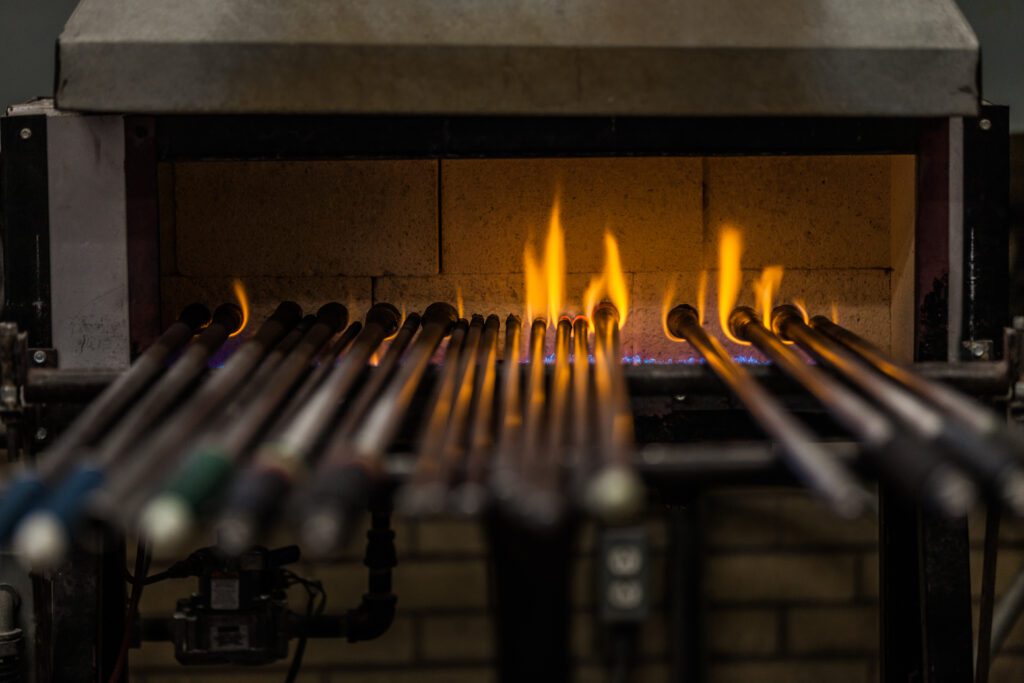
Preventive maintenance is crucial for ensuring the longevity and efficient operation of heating systems. Regular maintenance tasks should be performed for both residential and commercial properties.
When it comes to the maintenance of heating systems, attention to detail is key. By following a comprehensive maintenance schedule, you can not only extend the lifespan of your system but also ensure that it operates at peak performance throughout its life.
Routine Maintenance Tasks
Here are some routine maintenance tasks that should be performed:
1. Inspecting and Cleaning Air Filters: Clean or replace air filters every 1-3 months to maintain optimal air quality and prevent system strain.
2. Checking Thermostat Settings: Verify that the thermostat is set to the appropriate temperature and functioning correctly.
3. Cleaning Vents and Registers: Dust and debris can accumulate in vents and registers over time. Regular cleaning improves airflow and reduces allergen buildup.
4. Inspecting Ductwork: Periodically inspect ductwork for leaks, damage, or blockages. Professional assistance may be required for larger commercial systems.
5. Lubricating Moving Parts: Proper lubrication of moving parts such as motors, bearings, and fans can help reduce friction and wear, extending the life of your heating system.
The Importance of Regular System Checks
Regular system checks facilitate early detection of potential issues before they escalate into major problems. By conducting regular inspections, you can identify and address minor faults, optimize system performance, and ensure energy efficiency.
Moreover, proactive maintenance not only saves you money in the long run by preventing costly repairs but also contributes to a healthier indoor environment. A well-maintained heating system operates more efficiently, providing consistent comfort while reducing energy consumption and carbon emissions.
When to Call a Professional
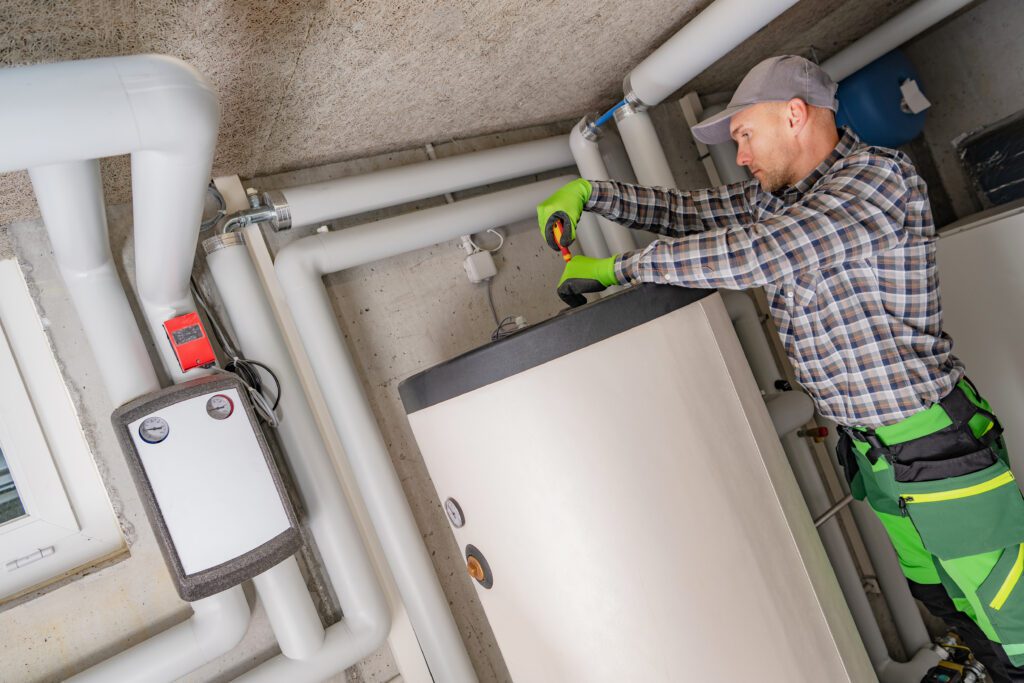
While regular maintenance and minor repairs can be handled in-house or by homeowners, some situations require professional attention. Knowing when to call a professional heating repair service is crucial to avoid further damage and ensure proper system performance.
Signs Your Heating System Needs Professional Attention
Consider contacting a professional heating repair service under the following circumstances:
1. Unusual Odors: Foul or unusual odors coming from the heating system can indicate potential hazards. Turn off the system immediately and seek professional assistance.
2. Frequent Cycling or System Short Cycling: If your heating system frequently turns on and off or cycles too quickly, it may indicate an issue with the system’s components. A professional can diagnose and repair the underlying problem.
3. Gas Leaks: If you smell gas or suspect a gas leak, leave the building immediately and contact the gas company and a professional service technician.
4. Weird Noises: Grinding, squealing, or other unusual noises might indicate mechanical problems. A professional technician can diagnose and fix the issue.
5. Inconsistent Heating: If some areas of your home are significantly colder than others, it could be a sign of an underlying issue with your heating system. A professional can identify the cause and restore balanced heating throughout your space.
6. High Energy Bills: If you notice a sudden increase in your energy bills without a corresponding change in usage, it could indicate an inefficient heating system. A professional can assess your system’s efficiency and recommend necessary repairs or upgrades.
Choosing the Right Heating Repair Service
When selecting a heating repair service, consider the following:
1. Experience and Expertise: Look for a service provider with a proven track record and experience in repairing heating systems similar to yours.
2. Licensing and Certifications: Ensure that the technicians are properly licensed and certified to work on heating systems.
3. Customer Reviews and Recommendations: Read customer reviews and seek recommendations to gauge the service provider’s reputation and reliability.
4. 24/7 Emergency Service: In case of emergencies, choose a service provider that offers round-the-clock assistance.
5. Warranty and Guarantees: Inquire about the service provider’s warranty and guarantee policies to ensure you are protected in case of any issues with the repairs or replacements.
6. Transparent Pricing: Request a detailed breakdown of the costs involved in the repair or maintenance service to avoid any surprises on your bill.
In conclusion, understanding the basics of heating systems and having knowledge of common problems and repair tips can help homeowners and commercial property managers address heating system issues efficiently. Regular maintenance, DIY repairs (when appropriate), and timely professional assistance ensure optimal heating system performance, energy efficiency, and occupant comfort. Remember to prioritize safety at all times and consult professionals when in doubt.

